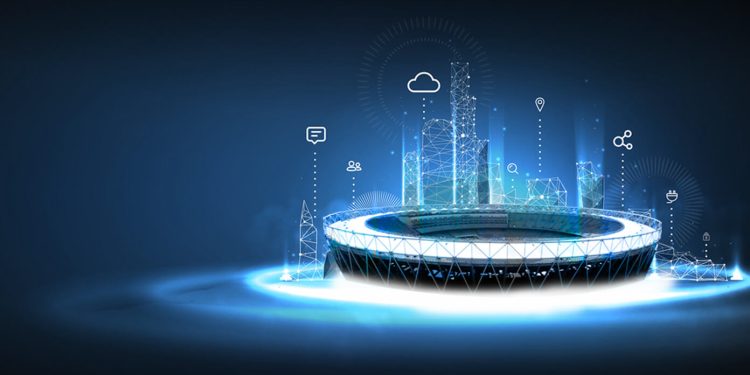The coronavirus pandemic sent shockwaves around the world, causing the world to shut down temporarily. Every industry, including the sports industry, was affected by this unprecedented crisis. The sports calendar was pushed back with sports teams suspending their activities and fans confined to their couches, waiting for the ‘good-old-days. As the ‘good-old-days of sports return, how can stadiums entice fans back to stadiums and provide them an even better experience? The answer is – smart stadium technologies, and that’s what we are discussing today.
Top smart stadium technologies
IoT Data and Smart Sports Stadiums
Although attending sports events in stadiums is a delightful experience, many people prefer to watch sports events on their televisions and smartphones due to the hassles they need to go through. Some of the issues with present stadiums are – parking issues, overcrowding, high ticket prices, and many others. IoT technology can enhance the overall experience and help stadiums become more competent in the following ways:
- As the audiences in the stadiums log on to their devices, cheer wholeheartedly for their teams, or buy drinks, they generate an enormous amount of data related to their behavior that IoT devices can collect. Companies can use this data to streamline the experience for the fans.
- Today’s customers need high-bandwidth internet connectivity all the time so that apps and websites load fast. Improved bandwidth also facilitates apps that help people in the following ways:
- Find parking spots
- Check-in and locate seats
- Order foods and beverages
- Purchase premium seat upgrades
- Watch replays of significant game moments
- Obtain traffic information to reach their homes
The evolution of IoT will enable improved bandwidth with which people will be able to experience sports like never before.
AR and VR technologies
One of the most exciting innovations the smart stadiums technology offers is Virtual Reality seats. VR seats allow audiences to have full audio and visual experience while at the stadium or sitting on their couch at home. This will benefit both the fans and organizers – fans will have a great sports experience while the organizers and teams will be able to augment their revenue.
Smart AR glasses, with an image recognition feature, will allow the audiences to see the historical and live stats of any player they focus their glasses on during the game. Every person attending the event will become a sports analyst with smart glasses. These glasses will present any relevant data fans can enjoy during the game to create a great fan experience.
5G Broadcasting
Sports venues are witnessing a 67% growth in data usage every year, which presents a significant opportunity to deliver enhanced networks in stadiums for better connectivity. 5G technology will lead the sports to a real-time era with ultra-low latency and high bandwidth.
With the help of 5G Broadcasting, sports stadiums will be able to stream their events like never before. They can provide fans with live streaming from referee cameras during the game, live drone views, and videos in other formats, such as – 3D or volumetric content, 360 videos with multi-angle possibilities.
The fans will be able to access an unlimited amount of data and streaming opportunities. With 5G’s improved connectivity, they can enjoy enriched content & services on their devices and become the stewards of their own experience.
Sports events will probably be gamified and offer collaboration opportunities between fans in the stadium.
Autonomous shuttles
Sports stadiums face two major problems today: the lack of parking spots during live events and the traffic jams created before the games.
These hassles can frustrate the fans and even deter them from attending live events.
In the future, stadiums will do away with massive parking lots, turning the space into something more productive and valuable, such as condos or retail space. As autonomous cars become more mainstream in the future, audiences will come to the stadiums riding in their autonomous vehicles that will do a drop-off and won’t hang around as today’s conventional cars do.
AI for Event Planning and management
With the help of AI event planning software, stadium managers can plan their events all in one place using intelligent data insights and analytics provided by AI technology. Stadium managers can also use traffic management tools to deal with and plan traffic challenges and create a system for reserved parking spots. With the help of AI, fans will no longer have to struggle to get inside stadiums. Facial recognition, powered by AI, will allow fans to enter the stadium without displaying their ticket. AI will also alert the staff when certain areas get overcrowded. Predictive analytics can tell in advance what attendance is likely to be so that the event can be planned and managed better.
NFT Ticketing
NFT digital tickets for sports events will allow the teams to turn sports tickets into digital assets.
Fans will be able to keep the ticket as a collectible and can even have the opportunity to sell their tickets after the event as collectibles.
Drone and Facial Recognition Security
Ticketing and security systems developed on blockchains will be an integral part of next-generation stadium access management. Other technologies that will help enhance the security inside stadiums will be – facial recognition and other novel identity technologies. Using facial recognition, stadium managers can identify people at walking speed upon entering a venue. Security drones would be deployed for overall security and facial recognition during the events.
Stadium Analytics
Stadiums are becoming increasingly connected – thanks to the advanced sensor technology. Connected stadiums generate vast amounts of data, which can be analyzed and used to drive convenience, efficiency, and profits. Analytics products and services across the areas, such as – fan behavior data, connected device data, crowd sentiment data, and others, will allow organizers and other businesses to enhance the viewer experience.
Wrap Up
Improving fan experience with innovative technologies has become necessary for sports stadium’s improvement and existence while competing with digital entertainment systems that keep modern audiences away from life experiences. Technologies such as AI, advanced analytics, IoT, NFT, blockchain, drones, facial recognition, 5G, and others will help organizers pull more audiences to stadiums and provide live-sports experiences like never before.







